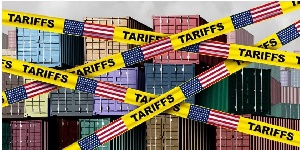- Home - News
- Elections 2024
- News Archive
- Crime & Punishment
- Politics
- Regional
- Editorial
- Health
- Ghanaians Abroad
- Tabloid
- Africa
- Religion
- Photo Archives
- Press Release
General News of Wednesday, 9 April 2025
Source: www.ghanawebbers.com
Tariff Follies - Like weaving a basket to catch the wind
Admiral Isoroku Yamamoto is often quoted as saying, “We’ve awoken a sleeping giant.” Some historians debate whether he actually said this. This statement came after Japan attacked Pearl Harbor during World War II.
Before the attack, America was hesitant to join another European war. However, Pearl Harbor changed that mindset. Even staunch isolationists supported entering the conflict. The U.S. then mobilized its military might against its enemies.
By 1945, Japan had been defeated after two atomic bombs were dropped on Hiroshima and Nagasaki. The proud empire surrendered unconditionally. The emperor, once seen as a divine figure, was demoted to a mortal status. This marked a significant humiliation for Japan.
Fast forward to 2025, and we see a different kind of conflict brewing—a trade war with no winners. America has awakened another economic giant: China. Since joining the WTO, China has become a major player in global trade.
Historically, the rules of international order have been shaped by Western nations since the industrial revolution. The West created these rules for diplomacy, trade, and finance. They also enforced them through institutions like the WTO.
In the 19th century, Britain led global empires while promoting colonialism in Africa. Colonized peoples struggled to resist their exploitation and loss of land.
After two devastating world wars, European empires collapsed. Since 1945, America has taken charge as the guardian of Western ideals—democracy and free markets must prevail globally.
The West has persuaded many poorer nations to follow these rules since communism's defeat in the early 1990s strengthened their worldview. Despite Russia being a nuclear power, its economy pales compared to others like the Netherlands.
The West celebrates globalization under American leadership while claiming exceptionalism. Until recently, STEM fields and multinational management were dominated by Western countries.
Now other nations are rising quickly; China leads this charge with India close behind. Both countries have unique political systems but are catching up with Western economies unexpectedly.
The West feels comfortable with India’s democracy despite its internal conflicts fueled by religious intolerance. In contrast, China evokes fear due to its different approach and rapid growth.
China produces more engineers annually than all of the West combined. Its domestic market could soon surpass those of both the USA and EU combined.
China's rise shows that nations can choose diverse paths toward development based on their histories. President Trump's focus on tariffs reflects an unfounded fear of rising powers.
He romanticizes past prosperity without acknowledging historical consequences like those from the Smoot-Hawley Act during the Great Depression. Applying outdated policies won't fix structural issues in America's economy or education system.
Investing in education would benefit America more than reactionary tariffs ever could. Currently, tariffs represent a new form of economic warfare akin to Pearl Harbor for international trade relations.
America initiated this round of tariffs; retaliation from other powerful nations is expected. A strong nation can bully weaker ones but not equally powerful rivals like China.
Trump’s tariffs may have inadvertently strengthened China's resolve instead of weakening it. Only internal challenges could slow China's progress—not external pressures from other countries.
If China becomes overconfident or engages in unnecessary military ventures abroad, it may lose momentum over time—but that remains speculative at this point.











